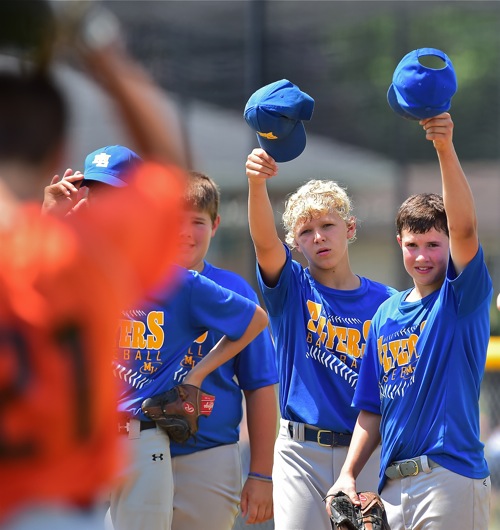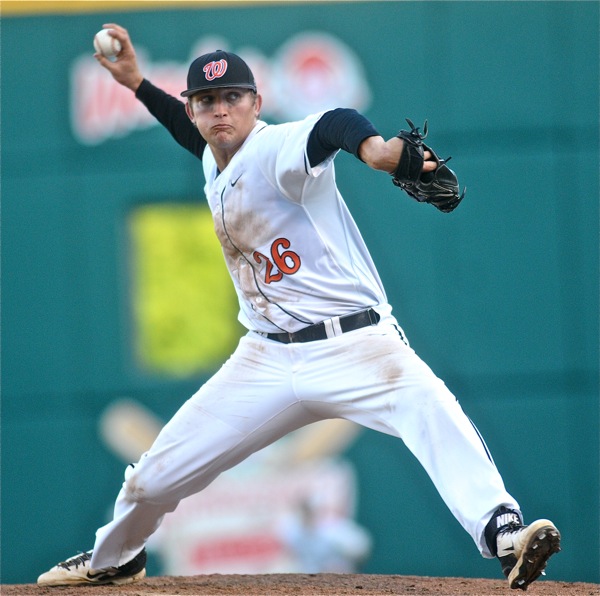There is a realization that comes with athletes and sports of all sorts…that sometimes we get ahead of ourselves – push the envelope – a sense that sometimes we’d be better to just wait, and let kids be kids a bit longer.
 Twice in the past two weeks I went to a youth baseball game armed and ready to write. Both times I came home with nothing to write – no story at all, except that baseball is a product of the natural process of how kids learn.
Twice in the past two weeks I went to a youth baseball game armed and ready to write. Both times I came home with nothing to write – no story at all, except that baseball is a product of the natural process of how kids learn.
What I came home with was confirmation about the ‘culture’ of contemporary amateur baseball, a subject about which I’ve written previously, because one size doesn’t fit all when it comes to who plays where, and when.
‘Select’, ‘travel’, or ‘elite’ baseball is the new standard of modern youth baseball. In my day it was Pony League, VFW, and Legion ball. Later, with the decline of American Legion and VFW budgets, ACME baseball crept upon the scene. Kids from one community grew up playing baseball together. Some were better than others, but it didn’t matter. Despite the difference in talent and maturity, the better kids played with the average kids, and through the strange magic of baseball osmosis the average and late bloomers gradually got better.
Since we all knew each other we were unafraid to ask the best player how he did something – to show us how. I well remember going home after morning baseball school at Hardman Field, in Piqua, determined to perfect what I’d witnessed and learned before the next day’s baseball. There were leagues and there were teams, yes, but there were no rules about participation – no courtesy runners and re-entry rules. There was competition to play, and if you weren’t good enough you knew you had to get better to get noticed, and eventually time on the field.
Some kids never played. I remember them, and I remember them as teammates – the pepper games, the jokes, the laughs, the practical jokes and talk in the dugout – everyone joined in. Whether they were content or not, they were one of us, happy to warm up pitchers between innings and throw with the outfielders. A couple of them received a varsity letter…after four years, because they had been loyal and committed to Piqua baseball. A lot of parents wouldn’t have that today.

There is no substitute for community baseball…where players of different sizes and skills learn from each other without the stigma of comparision, and a sense being left behind.
Then, several years ago the culture of baseball began to change. Adults, seeking more immediate gratification, in some cases for their own kids, began organizing ‘elite’ teams, that traveled on weekends and played four times a week, instead of once or twice. It was expensive, but there was a willingness to pay, and a justification that travel baseball gave kids the opportunity to develop quicker because they would play against better talent from other communities. The old adage: You have to play the best to be the best.
But some kids weren’t ready to play against the best, and it showed through a disparity in talent and maturity. And 14 and 15-year-olds aren’t accustomed to four games in four days, and a commitment to daily consistency that makes baseball feel more like a job than fun with your friends.
Fast forward to these past weeks and this is what I observed. I saw kids who were freshmen in age, but seventh graders in baseball experience and instinct. I looked at the rosters to see that they came not from different towns, but different counties. I watched closely and observed that shortstops and second basemen lacked the arm strength to turn the double play. I saw hitters that couldn’t catch up to a 75 mile-per-hour fastball; and in one case the opposing pitcher was throwing at least five miles faster. Five mph in baseball terms is like a human running against a thoroughbred horse.

Plan now for High School spring training…or NCAA early tournament action on the sun coast of Florida.
This is not a knock on the kids. Rather, it’s the reality of human development…and the realization that it’s sometimes best to stay at home for another year and play with your friends – ACME ball, Legion ball, and a more gradual ascent to better competition. This would be hard to sell, of course, because kids like to play with ‘elite’ on their shirts. It’s more fun to travel on weekends, and parents support their ambition out of pride and the obligation to provide the best opportunity possible. Kids dream bigger now, and there’s nothing wrong with that.
But this was no dream. Rather, a nightmare that was over as soon as the opposing team had scored ten runs in four innings – physical errors, mental errors – discouraging. A coach, displaying his own frustration told them afterwards, “You guys are better than this.”
 Actually, they weren’t. But they will be someday if they keep playing, observe, and experience enough baseball. – probably one more year. It can happen in the blink of an eye.
Actually, they weren’t. But they will be someday if they keep playing, observe, and experience enough baseball. – probably one more year. It can happen in the blink of an eye.
I came home and stashed my notes away. It wouldn’t be fair – a case of too much, too soon. It was simply nature, and the awkward fact that they can’t know what they can’t know – that sometimes it’s better to improve through home schooling, and without the pressure of comparison – without the fear that you’re being left behind.
Bottom line: There is still a need for community baseball, like you see locally in Auglaize, Mercer, and Shelby counties. And look at the OHSAA state titles won in the past two decades by Minster, Fort Loramie, and Coldwater – seven of them!
I wrote down some names, and will make it a point to see them again next year. I expect to then write a different story…about the caterpillars that became butterflies. They call it metamorphosis.
Baseball is no different.


